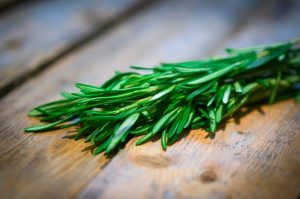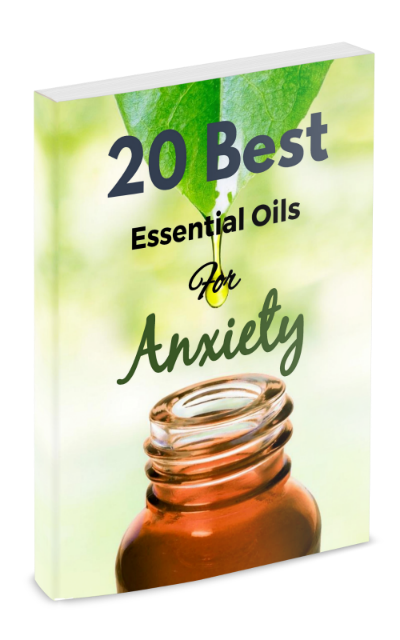Rosemary Essential Oil has a balsamic aroma, with a camphoraceous and slightly woody character. It promotes self-identity, bolsters self-confidence, renews enthusiasm, and encourages mental clarity.
Rosmarinus officinalis is the name of the plant that gives us rosemary essential oil. Rosemary belongs to the mint family of plants, and it grows natively in the Mediterranean.
Rosemary grows as an evergreen shrub, and some species can grow to as high as five feet. It has green leaves which resemble needles, and it produces pink, blue, or white flowers.

Use of Rosemary Essential Oil for the Mind
Rosemary’s ties with remembrance come from its ability to enhance memory. It is not uncommon to use rosemary essential oil when studying. It will also improve mental clarity. It has an invigorating and encouraging effect on the mind.
The essential oil of rosemary can be used boost the morale. It can also bolster self-confidence and embolden the spirit.
People who are feeling gloomy, are apathetic, and have a poor sense of self-worth might also find rosemary beneficial. If there’s a need to renew resolve, and boost a healthy ego, rosemary essential oil can help.
Rosemary Essential Oil Helps Relieve Depressions Caused By
- Low morale, poor concentration and memory
- Apathy and gloom. Unable to see the positives in life
- Poor sense of self-worth. Self-doubt; lack of a strong healthy ego
Blending Rosemary Essential Oil for Additional Causes of Depressions
- Thyme and Lemon: When feeling dejected and lacking enthusiasm
- Myrrh and Oregano: When lonely, miserable and despondent
- Petitgrain and Orange: In times of frustration, confusion and insecurity
- Clary Sage and Thyme: Restlessly distracted, demoralized and in low spirits
Use of Rosemary Essential Oil for the Body
Rosemary essential oil has a series of much-studied beneficial effects on the respiratory system. It has antiseptic qualities which can be used to treat respiratory infections. Rosemary oil might also be used to treat symptoms of allergies by people who are not allergic to rosemary. It can clear congestion and soothe sore throats.
The essential oil of rosemary also has an analgesic effect. It can help people deal with headaches, muscle, or even joint pain. Rosemary oil also acts anti-inflammatory.
Rosemary essential oil is extensively used in skin and hair care. It can tone the skin, and its antiseptic qualities might be helpful to people with skin conditions. Eczema for example.
For the hair, the essential oil of rosemary stimulates hair follicles. This is one of the reasons rosemary oil is often used in products used for treatment of hair loss.
Rosemary in Ancient History
Rosemary had a prominent place in ancient Europe. It played a central part in myths and a was a beloved plant for its medicinal uses. The Greek goddess Aphrodite emerged from the sea after being born with rosemary draped around her, according to legend.
In Christian mythology, rosemary is tied with the Virgin Mary. It is said that once when she wanted to rest, she spread her blue cloak over a rosemary bush with white blossoms. Its flowers turned blue, and the plant was called Rose of Mary ever since.
Rosemary was also known for its beneficial properties, especially the ability to improve memory. Pliny the Elder and Dioscorides wrote about it, and ancient Greek scholars wore the rosemary flowers on their heads.
Rosemary in Modern History
The tie between rosemary and remembrance continued into the Middle Ages. Rosemary was often used in funerals and weddings, in situations when remembrance was important. It was also believed to ward against evil spirits and dispel negative magic.
By the tenth century medicinal properties of rosemary were already well documented in Europe. By the thirteenth century, it became a favorite for meat flavoring in Spain.
Nicholas Culpeper, the English seventeenth-century botanist and the author of The Complete Herbal, wrote a lengthy entry about rosemary in his book, which included:
“It helps the pains in the gums and teeth, by rheum falling into them, not by putrefaction, causing an evil smell from them, or a stinking breath. It helps a weak memory, and quickens the senses.
It is very comfortable to the stomach in all the cold griefs thereof, helps both retention of meat, and digestion, the decoction or powder being taken in wine. It is a remedy for the windiness in the stomach, bowels, and spleen, and expels it powerfully.”
Rosemary Essential Oil Cautions:
Rosemary essential oil can cause allergic reactions, and it can also induce vomiting when taken orally. Rosemary essential oil should be avoided by children, during pregnancy, and when nursing.


